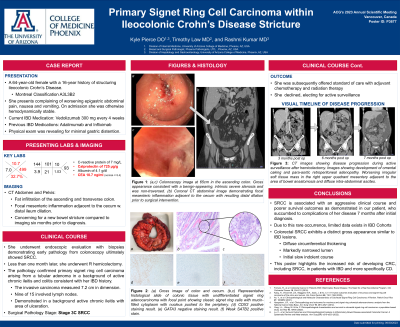Tuesday Poster Session
Category: IBD
P3678 - Primary Signet Ring Cell Carcinoma Within Ileocolonic Crohn’s Disease Stricture
Tuesday, October 24, 2023
10:30 AM - 4:00 PM PT
Location: Exhibit Hall

Has Audio

Kyle M. Pierce, DO
University of Arizona-Phoenix
Phoenix, AZ
Presenting Author(s)
Kyle M. Pierce, DO1, Rashmi Kumar, MD2
1University of Arizona-Phoenix, Phoenix, AZ; 2Banner - University Medicine Digestive Institute, Phoenix, AZ
Introduction: Inflammatory bowel disease (IBD) associated colorectal cancer (CRC) is associated with a significant portion of IBD mortality with studies demonstrating mortality rates in IBD-CRC patients between 10% to 15%. Signet ring cell carcinoma (SRCC) is a rare and devastating form of adenocarcinoma that makes up less than 1% of all CRC. While previous case reports have documented IBD with small intestine SRCC, here we present an abnormal case report of SRCC, arising from a tubular adenoma within chronic ileocolonic Crohn's disease (CD).
Case Description/Methods: A 64-year-old female with a long-standing history of stricturing ileocolonic CD (Montreal classification A3L3B2) who was maintained on vedolizumab infusion every 4 weeks, presented to our clinic with acute onset epigastric pain and nausea. Her physical exam did not elicit any specific signs of concern. Her vitals were otherwise stable. Labs performed showed elevated calprotectin of 725 µg/g but normal CBC, CMP, and c-reactive protein. Given her history of stenotic disease, she underwent a colonoscopy that demonstrated an intrinsic area of severe stenosis in the ascending colon. Multiple biopsies were taken of this stenotic region which ultimately demonstrated SRCC. Later, she underwent laparoscopic hemicolectomy with ileocolonic anastomosis. During surgery, no obvious mass was seen. The pathology later confirmed SRCC with local lymph node metastasis arising from a tubular adenoma in a background of chronic ileitis/colitis, consistent with her IBD history. After surgery, the patient preferred active surveillance compared to adjuvant chemotherapy. Ultimately, less than a year after surgery her CT scans show local recurrence and distant metastasis.
Discussion: To our knowledge this is one of few documented cases of SRCC presenting within a background of active ileocolonic CD. Cases of simultaneous SRCC and CD have been reported, but no clear association has yet been established. Some risk factors include extent of inflammation, younger age at diagnosis, family history of CRC, and coexistence with primary sclerosing cholangitis. Notably, several recent studies show an overall risk reduction in the development of CRC in IBD, likely due to early diagnosis, frequent surveillance and advanced treatments reducing overall inflammation in these patients. With SRCC being a particularly aggressive form of CRC, we highlight the importance of prompt evaluation in uncontrolled CD patients and new colonic strictures.
Disclosures:
Kyle M. Pierce, DO1, Rashmi Kumar, MD2. P3678 - Primary Signet Ring Cell Carcinoma Within Ileocolonic Crohn’s Disease Stricture, ACG 2023 Annual Scientific Meeting Abstracts. Vancouver, BC, Canada: American College of Gastroenterology.
1University of Arizona-Phoenix, Phoenix, AZ; 2Banner - University Medicine Digestive Institute, Phoenix, AZ
Introduction: Inflammatory bowel disease (IBD) associated colorectal cancer (CRC) is associated with a significant portion of IBD mortality with studies demonstrating mortality rates in IBD-CRC patients between 10% to 15%. Signet ring cell carcinoma (SRCC) is a rare and devastating form of adenocarcinoma that makes up less than 1% of all CRC. While previous case reports have documented IBD with small intestine SRCC, here we present an abnormal case report of SRCC, arising from a tubular adenoma within chronic ileocolonic Crohn's disease (CD).
Case Description/Methods: A 64-year-old female with a long-standing history of stricturing ileocolonic CD (Montreal classification A3L3B2) who was maintained on vedolizumab infusion every 4 weeks, presented to our clinic with acute onset epigastric pain and nausea. Her physical exam did not elicit any specific signs of concern. Her vitals were otherwise stable. Labs performed showed elevated calprotectin of 725 µg/g but normal CBC, CMP, and c-reactive protein. Given her history of stenotic disease, she underwent a colonoscopy that demonstrated an intrinsic area of severe stenosis in the ascending colon. Multiple biopsies were taken of this stenotic region which ultimately demonstrated SRCC. Later, she underwent laparoscopic hemicolectomy with ileocolonic anastomosis. During surgery, no obvious mass was seen. The pathology later confirmed SRCC with local lymph node metastasis arising from a tubular adenoma in a background of chronic ileitis/colitis, consistent with her IBD history. After surgery, the patient preferred active surveillance compared to adjuvant chemotherapy. Ultimately, less than a year after surgery her CT scans show local recurrence and distant metastasis.
Discussion: To our knowledge this is one of few documented cases of SRCC presenting within a background of active ileocolonic CD. Cases of simultaneous SRCC and CD have been reported, but no clear association has yet been established. Some risk factors include extent of inflammation, younger age at diagnosis, family history of CRC, and coexistence with primary sclerosing cholangitis. Notably, several recent studies show an overall risk reduction in the development of CRC in IBD, likely due to early diagnosis, frequent surveillance and advanced treatments reducing overall inflammation in these patients. With SRCC being a particularly aggressive form of CRC, we highlight the importance of prompt evaluation in uncontrolled CD patients and new colonic strictures.
Disclosures:
Kyle Pierce indicated no relevant financial relationships.
Rashmi Kumar indicated no relevant financial relationships.
Kyle M. Pierce, DO1, Rashmi Kumar, MD2. P3678 - Primary Signet Ring Cell Carcinoma Within Ileocolonic Crohn’s Disease Stricture, ACG 2023 Annual Scientific Meeting Abstracts. Vancouver, BC, Canada: American College of Gastroenterology.
